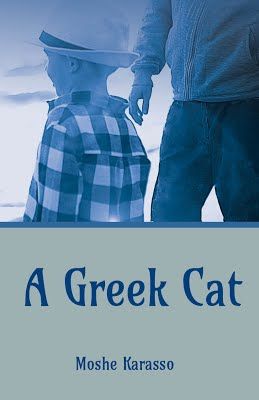Today, I am happy to bring you an excerpt from A Greek Cat, a novel by Moshe Karasso.


Excerpt – Childhood
On the island where I was born, there was a long pier that bisected the small and enchanting port into two. On either side, the fishing boats would drop anchor in the protected harbor, its green brackish water spotted with gasoline stains. The sunbeams that struck the water fractured into a thousand hues, and the seaweed and fish carcasses that floated on the surface rocked languidly with the waves. Sometime the smell of fish was so sharp that the island’s cats would rest on their haunches like sphinxes, inhaling the scent and waiting.
When the sun started to set and the boats were preparing for their evening fishing expeditions, the decks would light up with dozens of bright lanterns, and the hum of the motors would mingle with the fishermen’s shouted goodbyes. On stormy days, the drunken masts would sway this way and that, almost crossing each other. Sometimes a breathless boy would burst out of a side street and scan the twilight for his father’s boat. He would identify it almost immediately by its silhouette, and if the boat he was looking for was already on its way out of the harbor, he would run down the pier alongside the boat and call out to the fisherman. Then the boat would slow down and edge up to the pier, and the fisherman would scold the child for his tardiness. The sack of food would be expertly thrown from the boy’s hand towards the boat, and, after flying over the water for a second that seemed to me an eternity, land in the fisherman’s sure hands.








December 14th, 2019 at 8:27 am
thanks for hosting